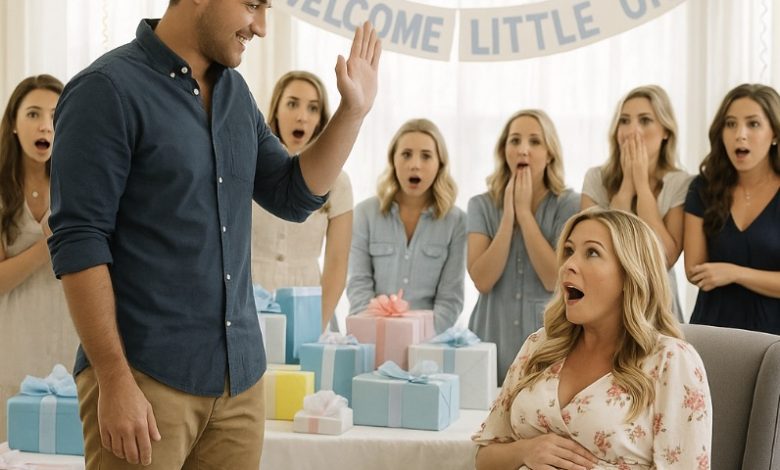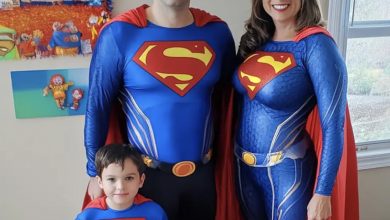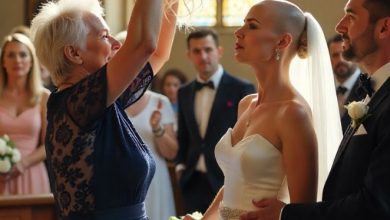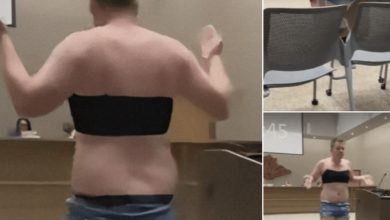During the baby shower, my fiancé said I was “unbearable,” not knowing I was expecting twins.

My fiancé called me “unbearable” at our baby shower. He had no idea I was carrying twins. He embarrassed me in front of thirty-seven guests, so I walked away. When I gave birth, he wasn’t there—but my best friend was. When the nurse asked who the father was, the words I spoke, and the name I wrote on the birth certificates, changed all of our lives for good.
The baby shower was supposed to be a happy day. My mother’s living room was full of pink and blue balloons. A three-tier cake shaped like toy blocks sat on the table. Thirty-seven people squeezed into the room with gifts, smiles, and soft voices. I was opening a box of burp cloths when a wave of nausea hit me. I had been fighting that same sickness for six months.
“Oh wow,” I said with a small laugh, pressing my hand over my mouth. “The morning sickness is still rough. Today I could barely keep down water before—”
Marcus jerked back like I had said something filthy. His face twisted, and his voice sliced through the room. “Can you not talk about your nasty pregnancy stuff in front of everyone? It’s bad enough I have to hear it at home.”
Everything went quiet. It felt like the air disappeared. All the voices stopped. Even the balloons seemed to stop moving.
My mother’s cheeks went red. “Marcus, she is carrying your—”
“You don’t get it,” he said, rolling his eyes and turning to our guests as if he wanted them to agree with him. “She has been unbearable since the day she got pregnant. Every tiny thing is a complaint.”
The burp cloths slid out of my hands and fell into the tissue paper. The crinkle sounded too loud in the silence. That one word—unbearable—hit me hard. It took my breath away more than the nausea ever did.
I put on a smile I had learned without meaning to, a smile that didn’t touch my eyes. “Let’s keep opening gifts,” I said in a calm voice that felt like glass. Something inside me didn’t break yet, but it did crack. I felt both babies kick at the same time, like they could feel my tension.
Yes—babies. Plural. It was still my secret. Marcus didn’t know we were having twins.
He was glued to his phone after that. People looked at one another with tight, careful faces, the kind people wear when they’ve just seen something ugly and don’t know what to say. My sister Sarah stood across the room, jaw locked, eyes blazing. I kept pretending everything was fine, unwrapping package after package. My engagement ring felt too tight, like it might cut off my blood flow. The babies rolled again, as if telling me they were there and they needed me to be strong.
The next morning I woke to the sound of Marcus getting dressed. The sky was still gray. He was moving quickly, annoyed, like every drawer and button had offended him. The faint light hit my ring and sent little rainbows around the room. They didn’t make me happy.
“About yesterday,” I said, my voice thick from sleep and nerves.
“What about it?” He didn’t look at me. He scrolled on his phone and buttoned his shirt at the same time.
“You humiliated me,” I said. “You did it in front of everyone we love.”
“I told the truth,” he answered, eyes still on the screen. “You’ve become unbearable.”
There it was again. Unbearable. As if I was something heavy he was forced to carry, and not the woman carrying his children.
“I’m growing our babies,” I whispered.
“My baby,” he corrected without any warmth. “And you’re using it as an excuse to be dramatic.”
He said “my baby” like there was only one. I put both hands on my belly and felt two separate little movements. Three weeks earlier, the ultrasound tech had smiled and pointed. Twins. Two small spines, two tiny hearts. I had tried to call Marcus, but he was “in a meeting,” then “in another meeting,” then “out with clients.” I decided to wait for the perfect moment. Standing there, I realized there would never be a perfect moment with a man who thought my very existence was a problem to manage.
He walked out without a goodbye. The door closed with a heavy sound that felt like a lid on a coffin. I sat at the kitchen table, looking at a pile of baby gifts that now felt like they belonged to someone else.
My phone buzzed. Sarah: Are you okay? Yesterday was messed up.
I typed: I’m fine.
She replied right away: Pack a bag. Come stay with me. I mean it. Now.
I looked at my ring. I looked at the ultrasound pictures on our fridge—the pictures Marcus had barely glanced at. The twins moved again, like a wave rolling under my skin. I stood up.
I pulled a suitcase from our closet and packed with steady hands. Maternity clothes. Vitamins. The hospital bag I had secretly prepared two weeks ago, hidden behind winter coats. When the suitcase was full, I sat down, slid my ring off slowly, and set it on the kitchen counter beside his unwashed coffee mug. I didn’t leave a note. The ring was enough. It was a full sentence all by itself.
I walked out and didn’t look back. The woman who believed in the pretty picture in my head was gone. I was a mother of two now. Marcus thought he had shamed me into silence. He thought I would come crawling back to apologize for being “unbearable.” He had no idea what was coming. He didn’t know about the twins. He didn’t know about the trust fund my grandmother had left me. He didn’t know that the next time he saw me would be in a hospital, and that the name I wrote on the birth certificates would not be his.
Three days passed before he called. I was lying on Sarah’s couch with my feet on a stack of pillows when his smiling engagement-party photo lit up my screen. I let it ring. He called again. And again. After the fifth try, Sarah took my phone and said, “Don’t answer. Let him feel what it’s like when someone ignores him.”
The texts started. Where are you? You’re being unreasonable. People are asking questions. Not “Are you safe?” Not “How are the babies?” No. He was worried about what people thought of him.
On the fourth day, he came to Sarah’s building. I heard his angry voice through the door. “She’s not your property,” Sarah said, firm and steady.
“She’s carrying my child!”
“Children,” Sarah said. “Twins. Or did you forget to ask?”
Silence. Then his voice, small and confused. “What twins?”
My stomach turned to ice. He truly had no idea. He was so busy complaining about me that he had never cared to ask about the most important thing.
“Ask your fiancée,” Sarah said. “Oh wait. She’s not your fiancée anymore.”
He slammed the front door so hard the window rattled. A minute later, my phone buzzed: Twins? Since when? Why didn’t you tell me? I shut the phone off and tossed it into a chair. Not every conversation is worth having.
That night, James came by with takeout. James had been Marcus’s best friend since college. He remembered my birthday when Marcus forgot. He brought me ginger tea when the morning sickness was bad. He sat down and unpacked containers quietly.
“He’s spinning a story,” James said. “He’s telling people you’re unstable and hormonal. He says you ran away because you can’t handle adult life.”
Sarah’s chopstick snapped in two. “That lying—”
“It gets worse,” James said softly. “He’s claiming you trapped him. That you got pregnant on purpose to force the wedding.”
My appetite vanished. “Do people believe him?”
“Some,” James said. “He’s charming when he wants to be. He can make himself look like the victim in any story.”
I knew that. I just hadn’t realized how far he would go.
I couldn’t sleep that night. The twins were very active, as if they were trying to swim away from stress. At three in the morning, I opened Sarah’s laptop and started a folder called TRUTH. I screenshotted every text. I transcribed every voicemail. I wrote down every conversation with dates and times. Sarah bought me a simple notebook, and I filled it with a timeline of all the small cuts I had ignored. First prenatal visit—he “couldn’t leave work,” then posted a golf story. Twin ultrasound—he stayed in the car “on a call,” while I could hear him joking about a sports bet. Baby shower humiliation—thirty-seven witnesses.
Looking back at those notes felt like reading evidence in a case. It made me angry, but it also made me clear.
By the second week, Marcus had turned it into a public show. Some friends called to “check on me,” but I could hear the fishing for drama under their kind voices. His mother left me several long messages about how “men are different” and how I should “go home and work it out like an adult.” I blocked her number.
Then came the hardest hit. Sarah walked in pale as paper. “He filed a police report,” she said. “He told them you took money from your joint accounts. He had the bank freeze everything.”
My stomach dropped. No access to our money meant no prenatal care, no delivery payment, nothing. It was a trap. He wanted to squeeze me until I broke and crawled back.
“I need a lawyer,” I said.
“I already called one,” Sarah said. “Patricia Reeves. She knows this kind of case.”
Patricia had sharp eyes and a tired kindness. She listened to everything and wrote fast. “What you’re describing is a kind of control we see too often,” she said. “Using pregnancy and children to control a partner. Your records are strong. Keep saving everything.”
I gave her the notebook, the screenshots, and a recording James had made one night when Marcus was drunk and mean. In it, he complained that the babies would ruin his life and said he wished I would “get rid of it.” Patricia nodded at the audio. “That will not help him,” she said calmly.
I asked her a question I had been afraid to say out loud. “If he doesn’t show up at the birth and hasn’t claimed paternity, can someone else be listed as the father?”
She looked at me for a long second. “The law can be complicated,” she said. “But if the biological father is not present and hasn’t taken steps to establish rights, there can be paths forward. There are risks. You need to think carefully.”
“And if I do nothing?” I asked.
“Then you will be tied to a man who has shown you nothing but disrespect and control,” she said. “He would keep using money, words, and systems to hurt you.”
The decision settled in me. Some risks are worth taking.
Labor started on a Tuesday. The drive to the hospital is a blur in my memory—breathing, counting, gripping Sarah’s hand. James met us at the entrance, white-faced and determined.
A nurse looked between us. “Are you the father?” she asked James.
I looked at him. James had been at the appointments Marcus skipped. He had sat with me through fear and excitement. He had rubbed my back when contractions started. He already loved the babies. Love is not always about blood. Love is about what you do, again and again.
“Yes,” I said. “He’s their father.”
That evening, the twins were born. We named them Emma and Oliver. They were small and perfect, and when the nurse put them on my chest, I promised them out loud, “You are safe. I will keep you safe.”
Two days later, Marcus burst into the hospital, shouting about his rights. Security walked him out. By then, the documents were filed. On both birth certificates, the father’s name read: James Michael Chen.
The court fight was harsh, but the truth was harder than any lie Marcus tried to sell. The judge wasn’t impressed by his sudden act as a devoted dad. His request for rights was denied. But he didn’t give up making our lives difficult.
For years, he tried to wear us down. He posted long stories online calling me a liar. He paid people to follow us. Anonymous reports were sent to child services, all false. It was a slow grind meant to drain our energy and money. We kept going. We kept records. We kept loving the children. James was a father in every way that mattered. He taught Emma to ride a bike and held Oliver’s hand on the first day of school. He checked closets for monsters. He did silly voices at bedtime. He showed up, every single day.
The final call came at 2:47 in the morning, one cold October night. Marcus’s voice was hoarse and broken. “I’m dying,” he said. “My liver is failing. I want to see them. My children.”
“They are not your children,” I said.
“They share my DNA,” he argued.
“DNA you insulted. DNA you tried to erase,” I said quietly.
“Please,” he whispered, voice cracking. “I want to apologize.”
“To whom?” I asked. “To children you ignored? To me, for years of harassment? To James, for trying to tear apart the family we made without you?”
“I was young and scared,” he said.
“You were thirty-two,” I answered. “I was scared too, but I chose love and responsibility. You chose yourself.”
In the end, he signed papers giving up all parental claims, in exchange for my promise that one day I would tell the kids he existed. Four months later he died, alone. His obituary did not list any children.
Emma and Oliver are ten now. They know they have a biological father who couldn’t be a dad. They also know that James is their real dad, the one who chose them and never left. They understand something true and simple: family is not about who shares your blood. Family is about who shows up and keeps showing up.
Our life is not the one I pictured when I picked out wedding colors and dreamed about a nursery. It is better. It is honest. It is calm. On the wall above the couch we have a photo from the twins’ first day of kindergarten. Emma’s hair bows are crooked. Oliver’s shoe is untied. James is laughing, and I am smiling with my whole face. When I look at it, I feel grateful for the day I put my ring on the counter and walked out the door. I didn’t know where I was going, but I knew I would not stay where love wasn’t real.
When people ask about our story, I tell them this: Sometimes the most powerful word you can say is “enough.” Sometimes the bravest thing you can do is choose a different path. And sometimes the name you write on a line—one simple name, written with a steady hand—can change three lives forever.










